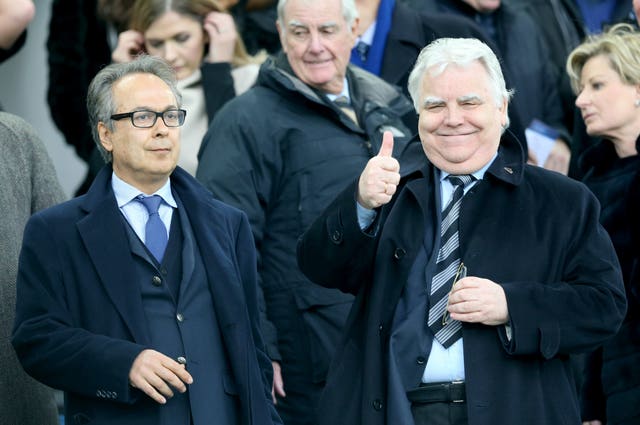
Bill Kenwright will stay on in his role as Everton chairman, the Premier League club have announced.
Following the departures of chief executive Denise Barrett-Baxendale, chief finance officer Grant Ingles and non-executive director and former striker Graeme Sharp last week, the future of long-serving chairman Kenwright had appeared in doubt.
However, Everton owner Farhad Moshiri revealed on Friday morning that Kenwright had accepted his request to remain at the club and help them through a period of transition.
Club Statement.
— Everton (@Everton) June 23, 2023
The recent board changes came in the wake of numerous supporter protests, with Kenwright, who has spent 19 years in his current role and is understood to have been planning to step down, the main target for fans’ anger.
“I wanted Bill to remain as our chairman during this important period of transition for the club and I am delighted that he has accepted my request to do so,” Moshiri said in a statement on the Everton website.
“Bill’s knowledge and vast experience will be crucial for us as we look to reset, deliver on external investment and position Everton for a successful future.”
 Everton owner Farhad Moshiri (left) will continue to work alongside Bill Kenwright (Martin Rickett/PA)
Everton owner Farhad Moshiri (left) will continue to work alongside Bill Kenwright (Martin Rickett/PA)
Everton also announced the appointment of Colin Chong as interim chief executive and director, while James Maryniak becomes interim chief finance officer.
Chong is currently the chief stadium development officer and has been focusing on the move to Bramley-Moore Dock, with Maryniak the club’s director of finance.
“In Colin and James, we have two experienced senior club professionals who have agreed to take on enhanced roles on an interim basis, and who we know can and will deliver immediately,” Moshiri said.
 Everton are planning to move to a new stadium at Bramley-Moore Dock in Liverpool (Peter Byrne/PA)
Everton are planning to move to a new stadium at Bramley-Moore Dock in Liverpool (Peter Byrne/PA)
As part of the changes, majority shareholder Moshiri will also join the board as a non-executive director alongside John Spellman, an experienced chartered accountant and Everton supporter.
American investors MSP Capital are close to agreeing a deal to buy a stake in the club, possibly up to 25 per cent.
Everton are also facing a Premier League charge for breaching profit and sustainability rules, having made cumulative losses of more than £430million over the last four seasons.


Why are you making commenting on The Herald only available to subscribers?
It should have been a safe space for informed debate, somewhere for readers to discuss issues around the biggest stories of the day, but all too often the below the line comments on most websites have become bogged down by off-topic discussions and abuse.
heraldscotland.com is tackling this problem by allowing only subscribers to comment.
We are doing this to improve the experience for our loyal readers and we believe it will reduce the ability of trolls and troublemakers, who occasionally find their way onto our site, to abuse our journalists and readers. We also hope it will help the comments section fulfil its promise as a part of Scotland's conversation with itself.
We are lucky at The Herald. We are read by an informed, educated readership who can add their knowledge and insights to our stories.
That is invaluable.
We are making the subscriber-only change to support our valued readers, who tell us they don't want the site cluttered up with irrelevant comments, untruths and abuse.
In the past, the journalist’s job was to collect and distribute information to the audience. Technology means that readers can shape a discussion. We look forward to hearing from you on heraldscotland.com
Comments & Moderation
Readers’ comments: You are personally liable for the content of any comments you upload to this website, so please act responsibly. We do not pre-moderate or monitor readers’ comments appearing on our websites, but we do post-moderate in response to complaints we receive or otherwise when a potential problem comes to our attention. You can make a complaint by using the ‘report this post’ link . We may then apply our discretion under the user terms to amend or delete comments.
Post moderation is undertaken full-time 9am-6pm on weekdays, and on a part-time basis outwith those hours.
Read the rules here